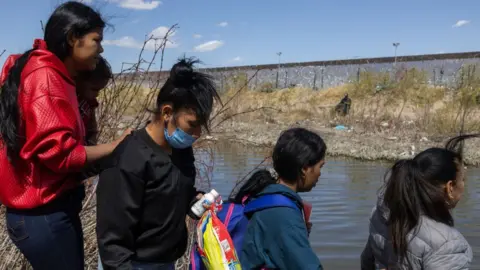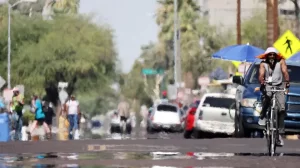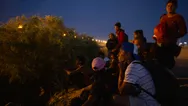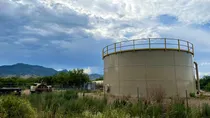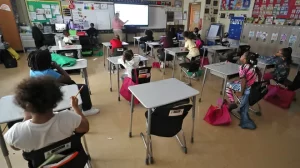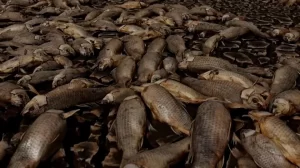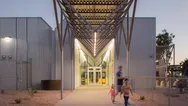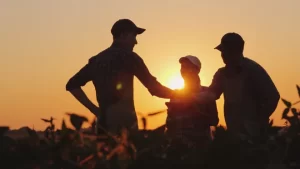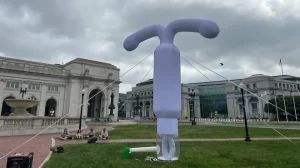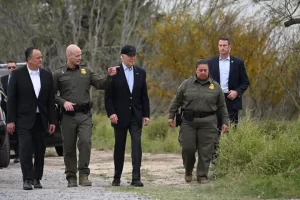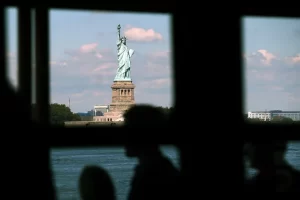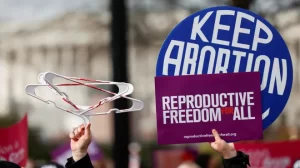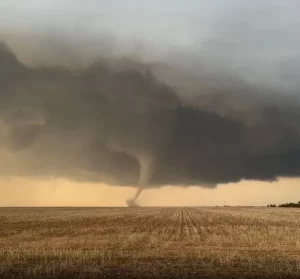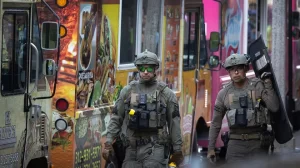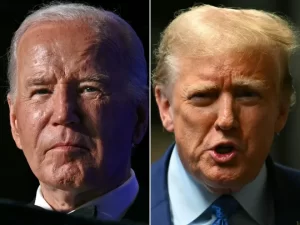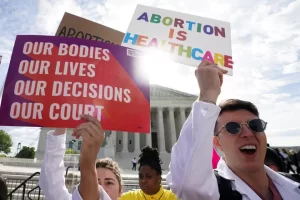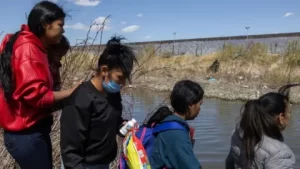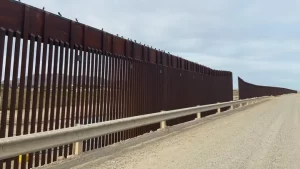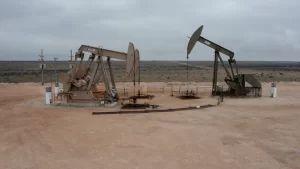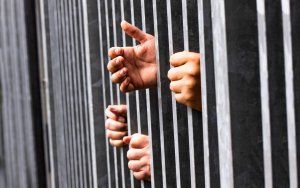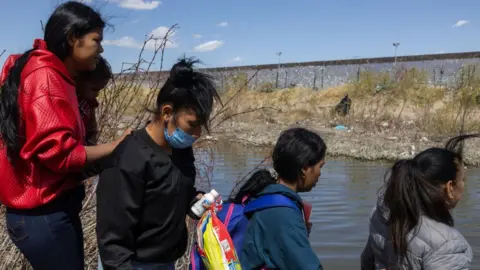
A controversial Texas law that is the focus of an intense legal battle could soon become one of the toughest immigration measures in any US state.
The law, known as SB4, would allow local and state police to arrest and prosecute undocumented migrants – upending US immigration enforcement.
Texas Governor Greg Abbott signed it into law last year, but court rulings have stopped Texas from enforcing it.
SB4 has been harshly criticised by the Biden administration and rights groups.
The law “will not only make communities in Texas less safe, it will also burden law enforcement, and sow chaos and confusion at our southern border”, White House Press Secretary Karine Jean-Pierre said in a statement.
But Mr Abbott and Republican lawmakers have argued that Texas has a legal right to defend against the rising number of migrants, and the Texas governor has frequently alleged that President Joe Biden has failed to secure the US southern border in violation of the law.
The governor’s office has not responded to the BBC’s request for comment.
Here’s what to know.
What is Texas Senate Bill 4, or SB4?
Immigration enforcement has been historically handled by the federal government, as crossing the border is a federal crime and addressed by immigration courts that fall under the justice department.
SB4 would change that by allowing Texas police officers to charge people with a newly created state crime – “illegal entry”.
Under the new law, local and state police in the state can detain individuals who they suspect may have entered the US illegally. Those stops would not be allowed in schools, healthcare facilities and places of worship.
If those individuals are found guilty, punishments can range from misdemeanours to felonies. They can carry prison time or fines of up to $2,000 (£1,570).
Penalties for illegal re-entry to Texas could go up to 20 years in prison, depending on a person’s immigration and criminal history.
The law also allows – and in some instances mandates – that Texas judges order people deported from the US.
Previously, detained migrants that were not charged with other crimes would be handed over to Customs and Border Protection officers.
How can SB4 be enforced?
In a guide for Texans, the American Civil Liberties Union (ACLU) – which has sued to stop SB4 – has laid out what it sees as a likely scenario in the event that the law goes into effect.
Most SB4 encounters will begin with police officers asking the “suspect” whether they are in the US illegally.
If the officer finds or believes that they are, the suspect would then be arrested and taken to a magistrate. They would then have to prove their legal status or be asked to agree to a state deportation. Those who do not agree can be jailed.
In practice, however, advocates believe SB4’s implementation is likely to be far more complex and murky.
Asylum seekers – whose cases are handled by the federal government – could be picked up by Texas law enforcement officers and removed from the country before their asylum cases are processed.
Widespread enforcement could also affect Texas businesses, as they rely on the labour that the nearly five million migrants in the state provide.
Adam Isacson, a migration and border expert from the Washington Office on Latin America, told the BBC that SB4 could create a “patchwork” enforcement pattern. Different counties might elect to implement the law differently, with some taking more aggressive approaches than others.
“A sheriff that has a lot of undocumented people in his community is not going to want to enforce it really strongly, because he needs the cooperation of that community’s residents in order to enforce other laws,” Mr Isacson said.
It is also unclear how removals will be carried out. Mexico has said it would not accept Texas deportations under “any circumstance”, and the international boundary is under the jurisdiction of federal authorities.
Texas has yet to comment on how local jails – which are in many cases overcrowded – would cope with any influx of people arrested under SB4.
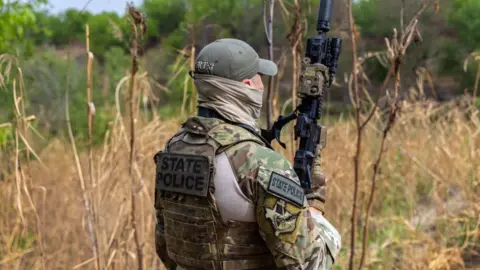
Why did Texas try to bring the law?
Governor Abbott has repeatedly said Texas needs SB4 to protect the state – and the wider US – from a “tidal wave” of undocumented migrants crossing America’s southern border.
He has regularly blamed the federal government and President Joe Biden of failing to adequately stem the migrant numbers, forcing Texas to “defend itself”.
“The President of the United States has a constitutional duty to enforce federal laws protecting States, including laws already on the books that mandate the detention of illegal immigrants,” Mr Abbott said in February.
The law is one of a number of steps taken by Texas unilaterally.
In March 2021, the state also launched Operation Lone Star, a multi-billion dollar border security programme it has credited with stopping hundreds of thousands of migrants from entering the US.
Why is there a legal battle?
As immigration enforcement is historically handed by the federal government and its immigration courts, this makes major changes to enforcement authorities and even could affect the relationships and agreements between the US and foreign countries.
The Biden administration and ACLU – both of which are involved in the legal battle – have argued that SB4 is therefore unconstitutional. The ACLU has also suggested that SB4 could lead to discrimination and racial profiling.
“States cannot adopt immigration laws that interfere with the framework enacted by Congress,” Associate Attorney General Vanita Gupta said in January.
The case also has some precedent that will need to be addressed in court.
Another controversial immigration law in Arizona, known as SB 1070 or the “show me your papers” law was partially struck down by the US Supreme Court. The judges ruled that federal law already fulfilled that function.
“That’s the dispute again here, and that’s a problem for Texas,” said Carl Tobias, a law professor at the University of Richmond. “In that case, the Supreme Court said that immigration is assigned to the federal government, not individual states.”
Mexico’s government has also reacted negatively to SB4, questioning Texas’ ability to enforce immigration laws and warning that it could violate the human rights of over 10 million people of Mexican origin in the state.
In late March, Mexico’s government filed a legal brief outlining the potential effects the law could have on US-Mexico relations.
In the brief, Mexico said that SB4 violates Mexico’s sovereignty and its right to determine who enters its territory. It said the law could “significantly” impact cross-border trade, and also lead to “undue harassment, arrest, expulsion and criminalisation” of Mexican citizens and people “who look Latino” in Texas.
How would it affect US immigration policy?
If SB4 takes effect, it could upend the entire US immigration system. Other states might follow Texas’ example and adopt their own immigration laws if Governor Abbott’s efforts are successful.
Already, lawmakers in Iowa have passed a bill making illegal immigration a state crime. It allows state courts to order deportations and to have law enforcement officers escort suspects to ports of entry at the border. The Iowa governor, Kim Reynolds, has not yet signed the bill.
Governors and state lawmakers who support Donald Trump and his maga movement “are seeing this as an opportunity to challenge the Supreme Court ruling that struck down SB 1070 in Arizona”, Mr Isacson said.
He noted that if SB4 is ultimately struck down by the Supreme Court, however, it may “in a blanket way, strike down all other states’ attempts” at similar legislation.
Author:: Bagombeka Job
Credit:: BBC USA


